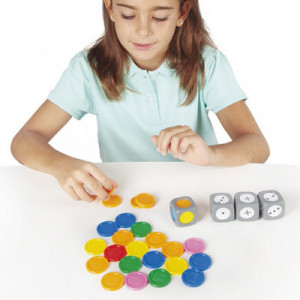Mathematics disorder (Dyscalculia)
Dyscalculia is a learning disorder characterized by difficulty managing numbers and mathematical or arithmetic operations.
Games for children with dyscalculia must work on basic mathematical concepts from a playful and multisensory perspective, so that they can approach these concepts from different senses, manipulate them and allow them to interact with them.
We have made a selection of fun and adapted math materials and games that help these children see, touch, and feel math.

Math games for children with dyscalculia
Dyscalculia affects the use of the brain's symbolic system and prevents understanding of basic numerical concepts. Depending on the grade, children may mechanically assimilate how to solve a numerical problem, but ignore the logic of the problem. On the contrary, other small children who do understand the logic of the problem are unsure how to apply the method of resolution.
Like all dyslexia, dyscalculia is a lifelong, but treatable condition. There are a wide variety of tools and strategies to help children with dyscalculia. You just need to make the right diagnosis and choose the ones that work best for your child.
Through fun exercises and activities, the child receives brain training that stimulates the network of neural connections that govern numerical language. This brain neuroplasticity implies that the child's nervous system, of which his or her brain is a part, is capable of changing its structure and functioning (especially at an early age).
The implications are immense for the child's future well-being: through training, the child can overcome his or her chronic condition as a dyslexic with compensatory mechanisms, adapt to the environment and lead a normal and productive life like other people.
Fun Math Games
The strategy of learning by playing takes advantage of the psychic effect that the game generates in the human brain. When a child plays, the body releases endorphins, substances that cause a state of well-being when the child achieves a goal or simply has fun.
Any therapy that includes play relieves the child of the stress inherent in being required to receive treatment. Because the child is having fun, he or she will be more motivated to work on his or her recovery.
The math games, besides being fun, also try to teach the child how to apply the acquired knowledge in his daily life. It's not about playing for the sake of it, to kill time. A goal is sought within the strategy outlined before the start of therapy. A game without challenges to overcome ends up boring the child, a step prior to abandonment.
For learning arithmetic operations, Akros creates sets of combinable tiles to perform different operations, or discover the complete multiplication table. Math games are intended for preschool age, and therefore look like toys. Its colorful tile format mitigates the gravity of learning math and turns teaching into a fun puzzle-solving game.

































